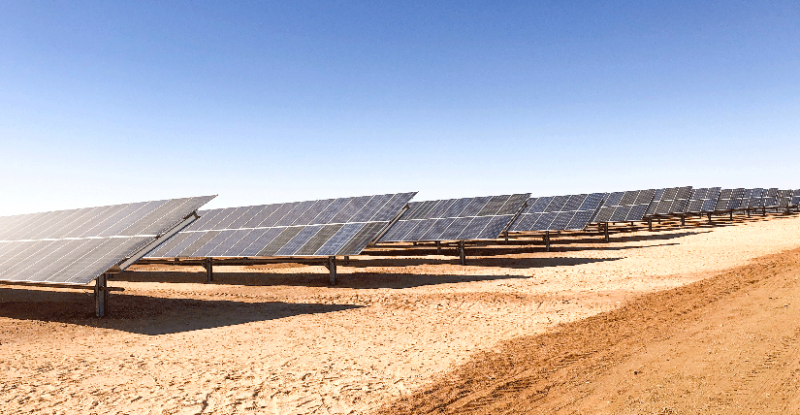PVTIME – On February 9th, South African President Cyril Ramaphosa, declared a “state of disaster” over his country’s crippling power shortages, saying they posed an existential threat to the economy and social fabric. Ramaphosa pledged to end an energy crisis that threatens economic and political stability.

Renewable energy: a solution to mitigate the energy crisis
Loadshedding is a well-known phrase among South Africa’s population. Scheduled and unscheduled power outages have become a reality for years. One crucial cause is that the vast majority of South Africa’s electricity is supplied by a fleet of coal-fired power stations that have been overused and under-maintained for years.
Phyllis Yang, Head of Sungrow Southern Africa, said: “The energy structure dominated by coal power lacks of resilience. Renewable energy contributes to mitigating the energy crisis, meanwhile, enabling the country to transition to a clean, affordable, and reliable energy system in the long term.”
With abundant sunshine, strong winds, and wave energy, South Africa is rich in renewable energy resources. Sourcing and producing clean energy within the country can allow South Africa to reclaim its energy independence while protecting the environment and creating jobs.
Utility-scale solar and storage projects are in progress
The local government already took action to fuel the energy transition gradually, including the Risk Mitigation Independent Power Producer Procurement Programme (RMIPPPP) launched by the Department of Mineral Resources and Energy in 2020. The initiative was started to fill the current short-term supply gap.
A combination of private and public sector involvement is needed. To encourage the private sector to participate in the renewable energy market, the government opens up market access for private energy players to engage in the market through the implementation of power purchase agreements (PPAs).
“Driven by the restart of REIPPPP, more private investments will flow into grid-connected renewable energy generation and more utility-scale projects will be commissioned. The customers need cutting-edge PV and energy storage solutions for utility-scale markets to catalyze the shift to a low-carbon future,” commented Phyllis Yang.
As a dedicated PV inverter and energy storage system solution supplier, Sungrow continues offering a competitive product portfolio. Last December, the Company partnered with SOLA Group to supply Africa’s Largest Private IPP PV Project of 256 MWp with its featured “1+X” Modular Inverters. This project will power five facilities of Tronox, the world’s leading integrated manufacturer of titanium dioxide pigment, through the wheeling agreements with Eskom.
Sungrow also provides energy storage systems (ESS) to solve the intermittency and volatility of solar power. The liquid cooled ESS PowerTitan tailored for utility-scale ESS demand, works excellently in terms of safety, profitability and flexibility when coupled with PV plants.
Energy self-sufficiency: a major concern for businesses
Organizations are being impacted in productivity and ultimately profitability due to loadshedding. If they wish to remain competitive, they should aim to become as self-sufficient as possible. Adding solar and storage systems in commercial & industrial (C&I) rooftops match the demand.
“Sungrow has engaged in plenty of local C&I projects to meet the electricity demand of the facilities’ daily operations. The Company is the No.1 player in the C&I PV market with a comprehensive product portfolio,” said Phyllis Yang.
Last year, Sungrow supplied its SG110CX commercial inverter solution to the largest rooftop PV plant at Cornubia Mall in South Africa, with a DC capacity of 5.25 MWp. The project can not only enable the shopping mall to reduce its emissions, but also save electricity costs.
To ensure a stable power supply all day long, Sungrow also provides the liquid cooled ESS PowerStack for C&I applications. The PowerStack is an innovative solution with a battery capacity ranging from 500 kWh to 4 MWh, available for two to four hour applications. The surplus energy that is generated during the day can be stored and used when the sun isn’t at its fullest potential.
More homes to be equipped with solar-plus-storage solutions
With South Africa enduring daily power outages, self-generation of electricity by South African households is likely to reduce rolling blackouts and high electricity prices without compromising the state power utility’s business model. The solar-plus-storage solution for homes is on the rise in demand, as the family can use all of the energy they produced by the solar system, even during the night.
Sungrow’s residential solutions are a perfect combination of hybrid inverters plus batteries. The holistic solutions enable the seamless switch to the off-grid mode during power outages, providing a flexible, durable, and safe power supply for local residents during the day and night, therefore reducing the dependence on the public grid and cutting energy costs. In order to use solar energy as efficiently as possible, monitoring is crucial. The full solutions can be monitored and managed via Sungrow’s iSolarCloud platform.
President Cyril Ramaphosa’s announcement of South Africa’s “state of disaster” pushed the green energy transition for South Africa. Within this context, the scaled-up policies that encourage consumers and investors to switch to solar power are in urgent demand. The technological leaps created by market players such as Sungrow will put South Africa ahead of the energy transition curve.
“We expect a long-term sustainable, reliable and accessible energy supply in the near future. Sungrow is well-prepared with a local team offering responsive and professional services to illuminate South Africa’s energy future,” concluded Phyllis Yang.











